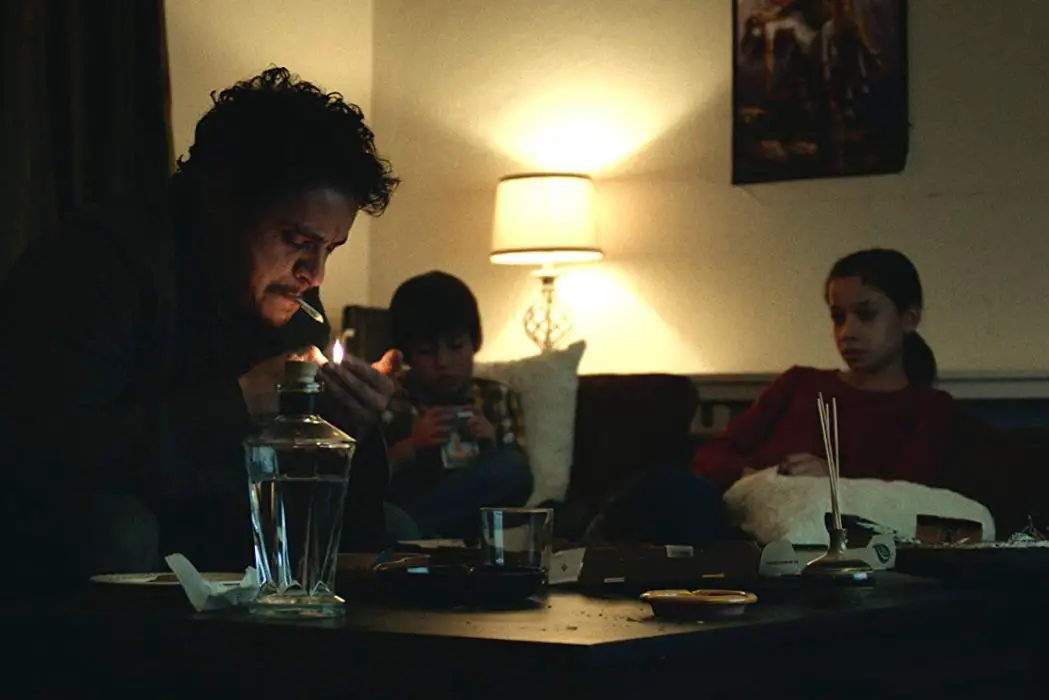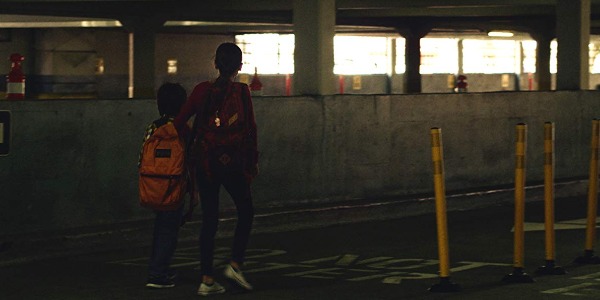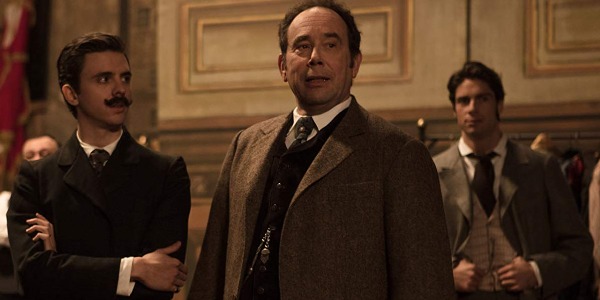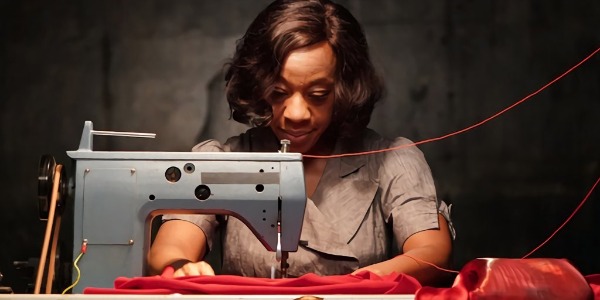2019 Film Fest 919 Final Report: COLLISIONS; CYRANO, MY LOVE; MARRIAGE STORY & IN FABRIC

I'm a student at the University of North Carolina at…
At last, we’ve reached the end of the road once again. This will be my final set of reviews from Film Fest 919; it was a true blast to cover this festival once again. In this report, I’ll take a look at four very different films: a family drama about the horrors of immigration from Richard Levien, a charming French period piece from Alexis Michalik, Noah Baumbach‘s pensive look at a collapsing marriage, and Peter Strickland‘s latest cinematic creation.
Collisions (Richard Levien)

The horrors of recent American history receive the narrative treatment in writer/director Richard Levien‘s Collisions, a film that tracks one immigrant family’s separation under the current directives from ICE and President Donald Trump. A small, decidedly low-budget affair that is still often quite moving and engaging, Collisions has the potential to take some viewers (including this writer) by surprise. Even if it feels somewhat hamstrung by its adherence to a digestible story, Levien‘s feature debut is enormously successful.
Collisions follows young Itan (Izabella Alvarez) and Neto (Jason Garcia Jr.), who live in California with Yoana (Ana de la Reguera), their devoted mother. Busy with her work in order to give her family the best chance at the American Dream, Yoana’s attention is always diverted, and it frequently feels like Itan is saddled with a large number of responsibilities that most kids don’t even have to think about. At a time when she’s just beginning to establish her own identity, Itan is responsible for making sure things run smoothly in her household.
Itan’s responsibilities grow even more dramatic one day, when her mother is taken by ICE to be deported from the United States. In one of the film’s more haunting moments, Itan and Neto return from school to find their door open and their mother gone; worse, it’s not immediately clear where she’s been taken to by the authorities. Faced with further interference by the foster system, Itan turns to Evencio (Jesse Garcia), her truck driver uncle with a traumatic past. Evencio initially wants nothing to do with the whole situation, but some sense of duty persuades him to undergo a road trip with his niece and nephew, all in the hopes of finding their mother in this labyrinth of a system.
Levien is an accomplished director, capturing images of profound terror and naturalistic beauty that always exist in stark contrast to one another. His screenplay is a bit shakier, both in regards to the tenor and manner of the dialogue and the more all-encompassing issues of story and narrative flow. Sometimes the conversations between the characters can feel a touch forced and stilted, manufacturing drama when it should flow more succinctly. In general, this small, scene-to-scene note connects to my largest issue with the film, which is that it all feels a bit too clean and cinematic for such a pressing societal issue. Collisions‘ aesthetic is spare and realistic, but its story fits nicely in a series of generic boxes and narratives. It’s a road movie with a redemption arc, and it’s always moving to bring that story to a satisfying conclusion.
Here’s the thing, though: that road movie with a redemption arc really, truly works. Something harsher and more complex may have worked better as a piece of social activism, but as storytelling, Collisions is often immensely compelling. In particular, the performances of Jesse Garcia and Izabella Alvarez are truly impressive; the entire movie hinges on their work and their complex relationship, and they pull it off effortlessly. Even if the conclusion feels a bit preordained, Garcia and Alvarez ensure that Levien‘s emotional punches land with force and gravitas.
Cyrano, My Love (Alexis Michalik)

On paper, Cyrano, My Love is not exactly my cup of tea. I’m not against period pieces or anything of the sort, but I certainly have an aversion to the kind of simple biographical treatments that pervade art house cinemas during the fall months. They’re a constant force, and Alexis Michalik‘s film seems to fit in those confines. As I was watching its narrative play out, I was reminded of The Man Who Invented Christmas, a film that posits that everything Charles Dickens wrote in A Christmas Carol—a work made under time constraints and economic pressures—came from some experience of his own. I expected my reaction to Cyrano, My Love to be similarly mixed.
Pleasantly, this was not the case.
As someone who is completely unfamiliar with the story of Cyrano de Bergerac, writer/director Michalik‘s account of its creation is actually quite fascinating—and deeply enjoyable on a pure storytelling level. The film follows Edmond Rostand (Thomas Solivérès), a French playwright in a serious creative rut. His latest show is a flop, and he needs something to help put food on the table for his wife (Alice de Lencquesaing) and family.
Two breakthroughs happen on his path to success. First, Edmond is introduced to actor Constant Coquelin (Olivier Gourmet) and subsequently commissioned to write a new play for the French star. Second, Edmond becomes a curious sort of liaison for Léo Volny (Tom Leeb), a close friend with a deep desire to impress the beautiful Jeanne d’Alcie (Lucie Boujenah). However, Léo does not possess Edmond’s miraculous way with words, and he uses his friend’s penmanship to seduce the love of his life. In the process, Edmond finds inspiration for his new show, creating one of the most acclaimed pieces of theater of the late 19th century.
Told with a cheerful verve, Cyrano, My Love is a wonderful confection, inserting a joyous “let’s put on a show” narrative into the context of this familiar historical piece. Often driven by Romain Trouillet‘s musical score, the film moves forward with a humorous and spirited energy, tracking Edmond’s path from artistic failure to triumph. In this manner, it’s a tried and true crowd-pleaser, but it earns so many of its emotional payoffs. Thomas Solivérès is a charismatic actor, armed with an appropriately anxious disposition; as Edmond, he’s the sympathetic center of the film’s orbit. However, even the supporting players get their moment in the sun—one of my favorite scenes is when Jean Coquelin (Igor Gotesman), the struggling thespian son of Constant, finally gets his chance to shine in the right role. Cyrano, My Love is a deeply un-cynical movie, and it benefits enormously from this fact.
This praise does come with one significant disclaimer. Considering the nature of Edmond’s relationship with Jeanne, it’s not surprising that Edmond’s wife takes exception to his behavior. This is a significant source of conflict throughout, but its ultimate resolution didn’t sit well with me, veering close to the kind of Great Man biopic nonsense that the rest of Michalik‘s film staunchly avoids. Still, this misstep in the finale is not enough to derail the entire endeavor, which remains a breezy look at the unconventional creation of a classic. It’s not revolutionary, but Cyrano, My Love‘s well-executed array of simple pleasures satisfies from start to finish.
Marriage Story (Noah Baumbach)

The first—and very best—movie I saw at this year’s Film Fest 919, Noah Baumbach‘s Marriage Story is such an extraordinary achievement that it’s difficult to know exactly how to approach it. An intimate tale of a relationship’s collapse that also contains tear-jerking flashes of grandeur and sentimentality, Marriage Story runs the emotional gamut with ease and dramatic clarity. It’s a remarkably even-handed portrayal of the messiness of divorce; each new scene brings about a new hero or villain in the story, to the point that, eventually, there are no heroes or villains at all. Guided by the magnificent performances of Adam Driver, Scarlett Johansson, and the entire supporting crew, Baumbach‘s latest is the kind of raw experience that I crave each fall season. It hasn’t left me since the moment the credits rolled.
Driver and Johansson star as Charlie and Nicole, a couple who recently decided to call it quits. Charlie is a wunderkind director of theater; Nicole is his muse, who gave up a potentially lucrative Hollywood career to launch a theater company with her husband. When the film begins, we’re treated to a montage of all the things they love about each other: the quirks, the habits, the shortcomings, and the complexities that define who they are. Set to Randy Newman‘s whimsical, melancholic musical score (maybe it’s my lingering childhood attachment to the Toy Story franchise, but his music is a guaranteed path to opening my tear ducts), this is a marvelous opening, rivaling the extraordinary montage in Pete Docter‘s Up in terms of sheer immediate emotional impact.
Naturally, this tranquility does not last. Charlie and Nicole initially agree to do a divorce without the presence or assistance of lawyers, fearing that it’ll divide their interests and pit them against each other at a time when their young son (Azhy Robertson) needs them. However, Nicole is convinced by a colleague to lawyer up for her impending showdown with her ex-husband, turning to high-profile divorce lawyer Nora (Laura Dern), who convinces Nicole that she’ll be on her side for good. Charlie, flabbergasted by this sudden departure from their plan, recruits the kindly Bert Spitz (Alan Alda) to do his bidding; unfortunately for him, Bert is basically the opposite of Nora when it comes to legal instincts.
As the conflict intensifies—Charlie eventually turns to Jay, a cutthroat lawyer played by Ray Liotta—Marriage Story becomes a film about the inhumanity of the legal system. Two people who seemed to be on a path toward an amicable split are now at each other’s throats, bogged down in legalese and technicalities that could drive any reasonable person insane. The ever-increasing tension of the film culminates in a blow-out set piece in which Charlie and Nicole finally unleash hell on one another; a standard argument becomes the foundation for a nightmarish and venomous airing of grievances. It’s horrifying, but it’s also sort of exhilarating to see two actors working at the peak of their abilities in such a sustained manner.
And, like many scenes in Marriage Story, the climatic verbal war ends in a stunning rush of catharsis. Even if Baumbach‘s saga is grueling and sometimes cynically hilarious, it’s also a warm and emotionally open film, as concerned with familial reconciliation as it is with the deterioration that forms its center. The key to it all is Driver, delivering the best performance of his career—and, quite frankly, of the year so far. It’s easy to see where his character goes wrong, but it’s also heartbreaking to watch him try so hard to keep it all together—as a father, as a partner, and as a human being. Those rare moments in which he cracks under the pressure are some of the most emotionally raw and honest you’ll see all year; they’re the most memorable touchstones of a near-masterwork.
In Fabric (Peter Strickland)

In Fabric remains the strangest movie I saw at Film Fest 919, and considering that it was my second-to-last screening of the festival, strange was a welcome respite from dourness and emotional heft at this point. Director Peter Strickland of Duke of Burgundy and Berberian Sound Studio fame goes for broke in this deeply weird horror-comedy, which follows a cursed dress, the unsuspecting customers that end up with the garment in their possession, and the bizarre department store cult that created this haunted object.
If that sounds like an unusual foundation for any film—let alone a comedy—that’s because it is. In Fabric is unpredictable, stylish, and often difficult to pin down; its flashes of unabashed excess are diluted by the presence of rather straightforward, involving character pieces, creating an uneasy combination. It’s ostensibly about how consumerism locates our weaknesses, allowing us to be seduced by the work of the devil, but its bifurcated narrative and strange mix of tones never allow that ultimate message to cohere.
In Fabric‘s initial half (a structural note that indicates the first sign of trouble) follows Sheila (Marianne Jean-Baptiste), a clerk looking to get back on the dating scene. Sheila currently lives with her messy son (Jaygann Ayeh) and his strange girlfriend (Gwendoline Christie), so she definitely needs to get out of the house more. On a routine trip to a local department store, Sheila is persuaded by the salesperson, a woman with an eerie, uncomfortable speaking pattern, to buy a stunning, elegant red dress for her date. Unfortunately, she gets much more than she bargained for—strange rashes, washing machine catastrophes, and, eventually, something much bleaker.
Dripping with lavish style and guided by Cavern of Anti-Matter‘s wickedly unusual score, In Fabric gets off to a strong start. It’s never particularly scary, but it’s suitably atmospheric and often quite funny, equipped with a distinct story that leans into its gonzo concept and a likable lead in Jean-Baptiste. The film is clearly interested in the way that the excesses of consumerism prey on us and our insecurities, pressuring us into illogical decisions that we would never otherwise make. With that guiding ethos, In Fabric coasts along as a fresh, funny, and singular horror-comedy.
And then, unfortunately, it keeps going for another hour. Sheila’s story ends, and the dress moves to the introverted Reg (Leo Bill) and his kind and supportive fiancée Babs (Hayley Squires). With this shift in attention, the film essentially repeats its initial narrative—the same jokes, the same odd events, and the same grim, ludicrous conclusion. In theory, perhaps there’s something trenchant in this repetition of this cycle, something that leads the film’s themes to a satisfying end. But in practice, it’s hopelessly dull, all leading to a ridiculous finale that stretches Strickland‘s brand of absurdity to its limits. There’s so much to love in In Fabric that I wish it all worked better, but that second half really sinks the whole bizarre concoction.
Collisions is currently seeking US distribution.
Cyrano, My Love was released in the US on October 18, 2019. For all international release dates, click here.
Marriage Story will be released in the US on November 6, 2019 and will debut on Netflix worldwide on December 6, 2019. For all international release dates, click here.
In Fabric was released on June 28, 2019 in the UK and will be released on December 6, 2019 in the US. For all international release dates, click here.
Does content like this matter to you?
Become a Member and support film journalism. Unlock access to all of Film Inquiry`s great articles. Join a community of like-minded readers who are passionate about cinema - get access to our private members Network, give back to independent filmmakers, and more.
I'm a student at the University of North Carolina at Chapel Hill. For 8 years, I've edited the blog Martin on Movies. This is where I review new releases, cover new trailers, and discuss important news in the entertainment industry. Some of my favorite movies- Casablanca, Inception, Singin' in the Rain, 2001: A Space Odyssey, The Wolf of Wall Street, The Nice Guys, La La Land, Airplane!, Skyfall, Raiders of the Lost Ark. You can find my other reviews and articles at Martin on Movies (http://martinonmovies.blogspot.com/).













